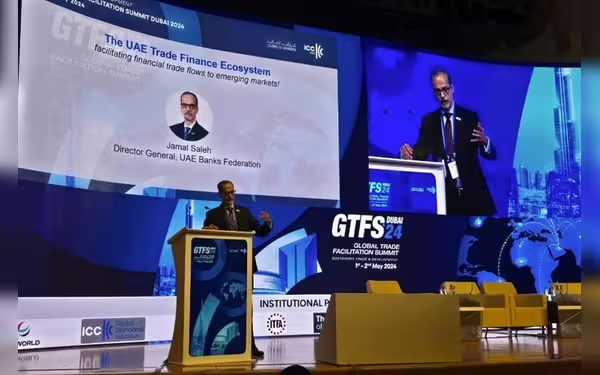Tuesday, July 2, 2024 04:24 PM
UAE Positioned as Global Trade Facilitator
- Rise in services trade driven by digitally delivered services
- Shift towards regionalization influenced by geopolitical pressures and climate concerns
- Integration of AI transforming trade operations and cutting costs
 Image Credits: ZAWYA
Image Credits: ZAWYAThe global trade landscape is evolving with a focus on regionalization, technological advancements, and sustainability. The UAE emerges as a key player in facilitating trade, while AI and renewable energy drive efficiency and environmental consciousness.
Global trade is set to rebound in 2024, following a brief dip in 2023. Experts predict a growth rate of 2.6%, driven mainly by the rise in services trade, particularly digitally delivered services. This growth outpaces that of goods and other services, propelled by the increasing integration of AI in supply chains and trade finance. However, challenges loom on the horizon, including geopolitical tensions, economic slowdowns in key regions, inflation, higher interest rates, and fluctuating commodity prices.
The landscape of global trade is undergoing significant changes, with deepening regional trade connections and the unlocking of efficiencies through innovative technologies. The aftermath of the Covid-19 pandemic has accelerated trends like the adoption of digital services and a shift away from traditional globalization. Regions such as Asia and the Middle East are expected to take center stage in forming new alliances and resilient supply chains.
Businesses and economies are increasingly focusing on resilience, leading to the formation of new regional trade blocs that heavily rely on technological advancements. The UAE, with trade hubs like Dubai, is positioned to play a vital role in sustainable technologies and global trade facilitation.
The trend towards regionalization is influenced by geopolitical pressures, climate concerns, and technological advancements, signaling a shift from past globalization efforts. This shift may be impacted by political events like the US election, potentially prompting protectionist measures. Friendshoring, the relocation of operations to allied countries through agreements, is expected to bolster inter-regional trading hubs in Asia and North America.
Supply chains are evolving rapidly as companies seek to mitigate risks from geopolitical uncertainties and protectionist policies. Emerging markets like Mexico, Vietnam, and India are emerging as alternative production sources to China, especially for manufacturing goods. In the Middle East, countries like the UAE are leveraging their neutrality, advanced trade infrastructure, and strategic location to enhance their role as trade facilitators.
The urgency to combat climate change is reshaping trade dynamics, with governments and businesses committing to net-zero goals. Trade is becoming a driving force in promoting renewable energy sources and sustainable technologies. Carbon-pricing mechanisms are evolving globally, creating opportunities for environmentally conscious suppliers and fostering a greener trade landscape.
The integration of AI is set to transform trade operations by optimizing supply chains, improving efficiency, and cutting costs through data-driven insights. Semiconductors are also gaining importance in the pursuit of technological advancement, particularly in electronics and the transition to greener practices.
As global trade evolves, embracing technological innovations and sustainable practices will be key to navigating the challenges and opportunities that lie ahead. The future of trade hinges on collaboration, adaptability, and a shared commitment to building a more resilient and environmentally conscious global economy.













